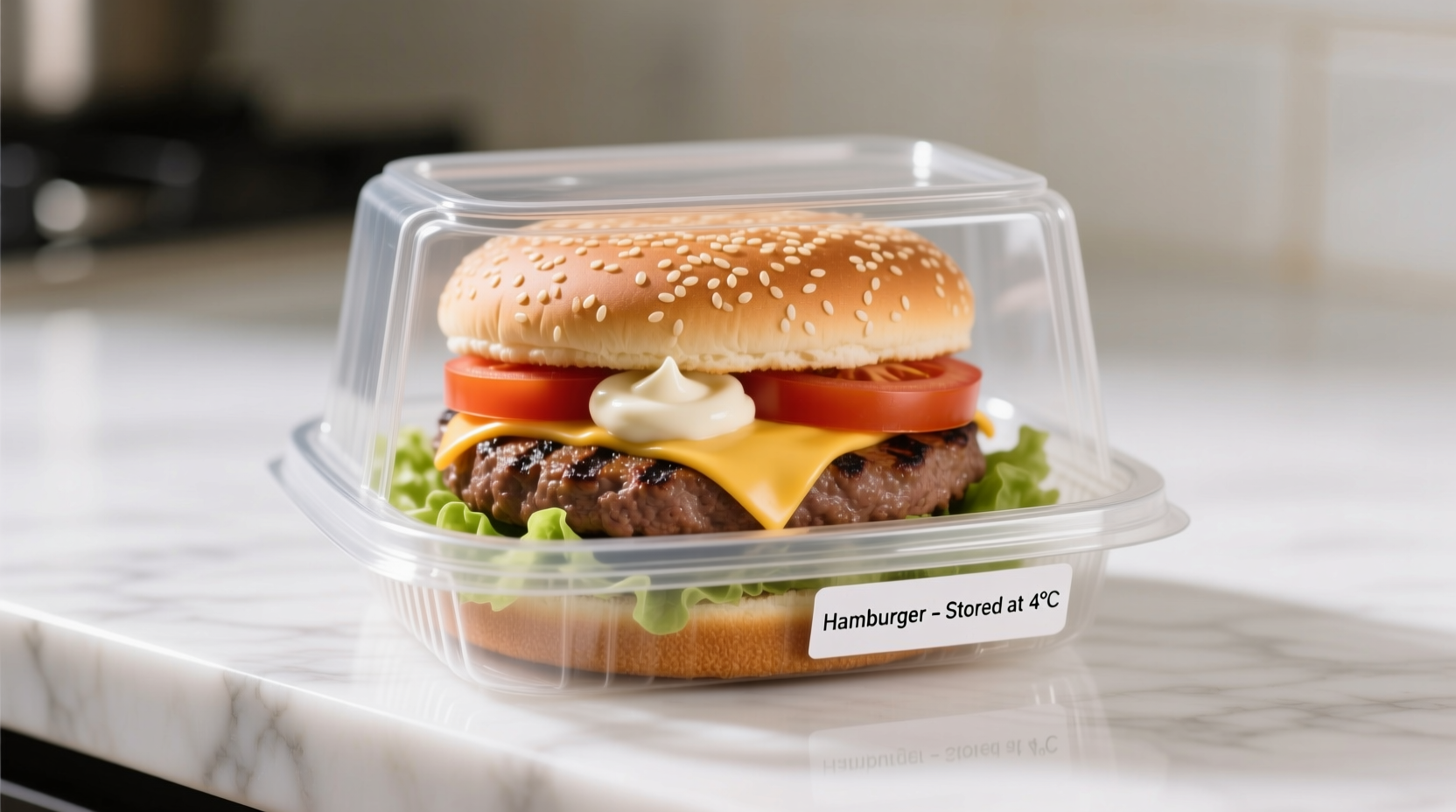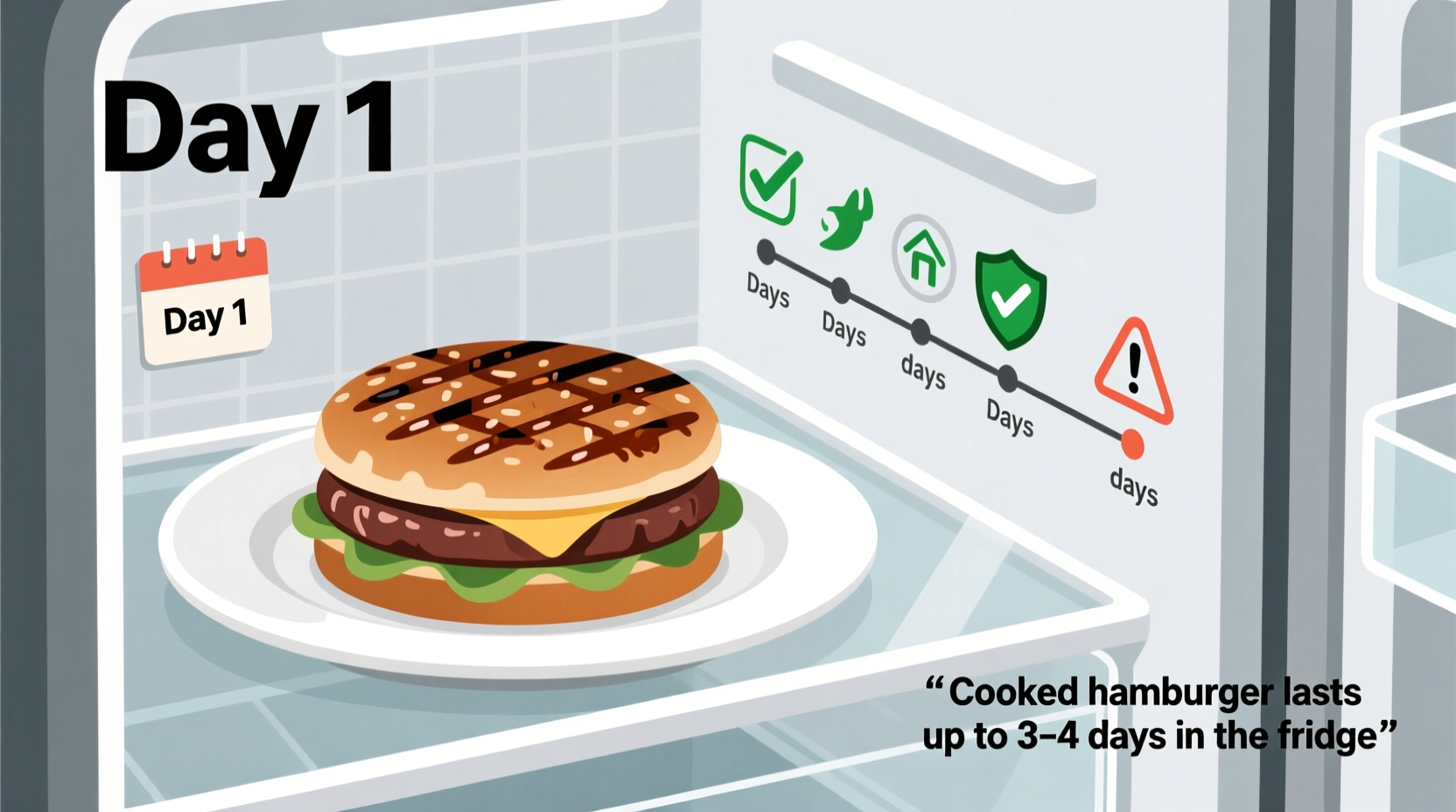Properly stored cooked hamburgers remain safe to eat for 3-4 days in the refrigerator at 40°F (4°C) or below, according to USDA Food Safety and Inspection Service guidelines. This timeframe applies to ground beef patties stored in airtight containers within two hours of cooking (or one hour if ambient temperature exceeds 90°F).
Ever found yourself staring at yesterday's burger wondering "how long does cooked hamburger last in fridge" before it becomes unsafe? You're not alone. Millions of home cooks face this food safety dilemma weekly, risking foodborne illness when unsure about proper storage timelines. Getting this wrong could mean unpleasant consequences from bacteria like Staphylococcus aureus or E. coli that thrive in improperly stored cooked meats.
Why Cooked Hamburger Storage Time Matters More Than You Think
Unlike whole cuts of meat, ground beef's increased surface area creates more opportunities for bacterial growth after cooking. The grinding process distributes surface bacteria throughout the meat, making proper post-cooking handling critical. When you search "how long are cooked hamburgers good in the refrigerator", you're really asking about preventing foodborne illness while minimizing waste.
| Food Storage Factor | Safe Practice | Risk of Improper Handling |
|---|---|---|
| Refrigeration Temperature | 40°F (4°C) or below | Doubling of bacterial growth rate for each 10°F increase above 40°F |
| Storage Container | Airtight container or heavy-duty wrap | Moisture loss and cross-contamination risks |
| Cooling Time Before Storage | Within 2 hours (1 hour if >90°F) | Bacteria multiplication in "danger zone" (40-140°F) |
Official Food Safety Guidelines You Can Trust
The USDA Food Safety and Inspection Service provides clear parameters for cooked ground beef storage. Their research shows that maintaining your refrigerator at or below 40°F slows bacterial growth sufficiently to keep cooked hamburgers safe for consumption for 3-4 days. This timeframe isn't arbitrary—it's based on bacterial growth studies in controlled laboratory conditions.
Temperature control represents the most critical factor in determining "how long does a cooked hamburger last in the fridge". The FDA Food Code establishes 41°F as the maximum safe refrigeration temperature, but the USDA recommends the stricter 40°F standard specifically for meat products. Using an appliance thermometer to verify your refrigerator's actual temperature (rather than relying on the dial setting) provides essential verification of proper storage conditions.

What Actually Happens During Refrigeration
Understanding the science behind "how long do cooked hamburgers stay good in the fridge" helps make informed decisions. After cooking, three critical processes occur:
- Initial Cooling Phase: As cooked hamburger cools from 140°F to 70°F, bacteria remain relatively dormant
- Danger Zone Transit: Between 70°F and 40°F, certain bacteria begin multiplying, though slowly in proper refrigeration
- Stable Storage: Below 40°F, most harmful bacteria enter stasis but don't die—explaining why frozen storage extends safety indefinitely
Contrary to popular belief, refrigeration doesn't kill bacteria—it merely slows their reproduction. This explains why even properly stored cooked hamburgers eventually become unsafe as bacterial colonies reach illness-causing thresholds.
Practical Storage Timeline for Maximum Safety
Follow this evidence-based timeline when storing cooked hamburgers:
- 0-2 hours after cooking: Cool to room temperature (must reach 70°F within 2 hours)
- 2 hours: Transfer to refrigerator in shallow containers (no more than 2 inches deep)
- Day 1-3: Optimal quality and safety window for consumption
- Day 4: Final safe consumption day—consume early in the day if possible
- Day 5+: Discard regardless of appearance—bacterial growth may not produce visible signs
How to Spot Spoiled Cooked Hamburgers (Before It's Too Late)
Don't rely solely on the calendar when determining "how long can cooked hamburger stay in fridge". Check for these spoilage indicators:
- Texture changes: Slimy or sticky surface film that wasn't present when first stored
- Odor development: Sour, ammonia-like, or "off" smells (fresh cooked hamburger should have mild meat aroma)
- Color shifts: Grayish hue or greenish spots (normal browning occurs but shouldn't be excessive)
- Mold presence: Any visible mold means immediate disposal of entire portion
Remember: When in doubt, throw it out. Pathogenic bacteria responsible for foodborne illness often don't produce noticeable changes in appearance, smell, or taste.
Proven Methods to Extend Cooked Hamburger Shelf Life
If you need to store cooked hamburgers beyond the standard 3-4 day window, freezing provides the only safe extension:
- Freezer storage: Wrap tightly in freezer paper or vacuum-seal for up to 4 months
- Portion control: Freeze individual patties with parchment paper between them for easy separation
- Thawing method: Always thaw in refrigerator—not at room temperature—to maintain safety
- Reheating standard: Heat to internal temperature of 165°F (74°C) regardless of storage method
For those wondering "how long does cooked hamburger last in fridge when stored properly", the answer remains 3-4 days regardless of storage method—only freezing extends this window safely.
Avoid These Common Cooked Hamburger Storage Mistakes
Even with knowledge of "how long do cooked hamburgers last in refrigerator", these errors compromise safety:
- Leaving at room temperature too long: The "2-hour rule" (1 hour above 90°F) is critical—never exceed it
- Storing in deep containers: Thick portions cool too slowly, spending dangerous time in temperature danger zone
- Using non-airtight containers: Allows moisture loss and potential cross-contamination
- Stacking warm containers: Creates heat pockets that prevent proper cooling
- Ignoring "use by" dates on store-bought patties: Pre-cooked store items have different timelines
Professional kitchens follow strict protocols for cooked hamburger storage duration that home cooks can adapt. The key difference? Commercial operations use temperature logs and strict time tracking that most households don't implement.
Special Considerations for Different Hamburger Variations
When determining "how long does cooked hamburger last in fridge", consider these variables:
- Cheese-topped burgers: Dairy components reduce shelf life by 12-24 hours
- Condiment-covered patties: Moisture from sauces accelerates spoilage
- Vegetable mix-ins: Onions, garlic, or other additions may shorten safe window
- Homemade vs. store-bought: Commercial patties often contain preservatives affecting storage
For food safety purposes, treat all cooked ground beef products as having the same 3-4 day refrigerator shelf life regardless of these variations. When asking "how long are cooked hamburgers good for in the fridge", the safest answer remains consistent across variations.
Putting It All Together: Your Action Plan
Next time you're storing cooked hamburgers, follow this simple protocol:
- Cool patties to room temperature within 2 hours (1 hour if hot)
- Place in shallow, airtight containers (no more than 2" deep)
- Label container with cooking date using permanent marker
- Store on refrigerator shelves (not door where temperature fluctuates)
- Consume within 72 hours for optimal safety margin
- Reheat to 165°F internal temperature before eating
This approach addresses the core question "how long does cooked hamburger last in fridge" while providing practical steps to maximize both safety and quality. Remember that food safety guidelines exist to prevent illness—not to create unnecessary waste. When stored properly, cooked hamburgers remain both safe and delicious within the recommended timeframe.











 浙公网安备
33010002000092号
浙公网安备
33010002000092号 浙B2-20120091-4
浙B2-20120091-4